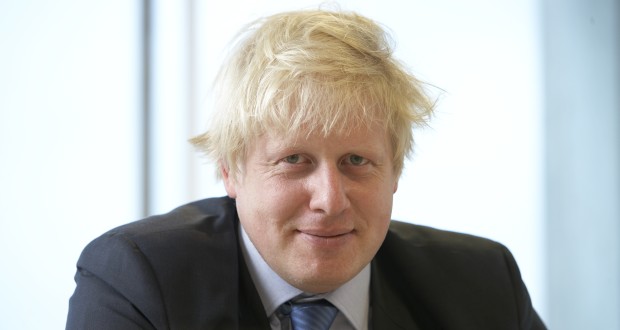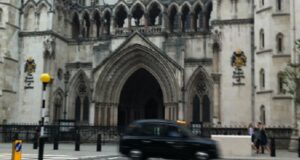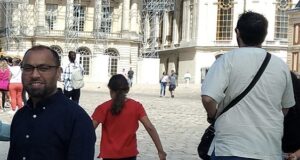The Mayor of London Boris Johnson has outlined details of the London Curriculum, which puts the city itself at the heart of learning in the capital. He announced his scheme during a speech he made at the Education Reform Summit – a two day conference organised by The Education Foundation and the Department for Education (DFE). The Education Foundation is a shadowy consultancy type think tank that appears to have been set up by a couple of blokes who had worked in education for a while. Quite what gives them the cachet that the DFE will hold a conference with them is not clear. ELN quite fancies the idea of running our own conference on education, in our spare time: but if we invited the DFE to come on board with us, we doubt, somehow, they’d play ball. How does the DFE choose its friends? Who funded the Conference? But we digress.
Mayor Boris tells us he is committed to driving up standards in education and raising attainment for London’s schoolchildren, regardless of background and where they live. The London Curriculum is one of several initiatives that have been introduced following recommendations that came out of his education inquiry. Initially comprising 15 modules, covering English, art, music, geography and history, the London Curriculum uses the city to bring to life the new key stage 3 National Curriculum in an exciting and innovative way.
The capital is the home of key figures in history, epoch defining events and innovations, leading institutions and great works and the new programme, which will be available to schools from September 2014, maximises the potential of the city’s rich heritage and unrivalled cultural assets to inspire teachers and students alike. The aim is to deepen subject knowledge, as a result of learning about historical and contemporary figures associated with London and direct experience of its museums, galleries, historic sites and other cultural assets.
Mayor Boris said: “Only a decade ago, education in London was lagging behind the rest of the country, with lower GCSE pass rates and sharp differences in results depending on a child’s background. Now, it is leading the pack for educational reforms and improving results. Raising attainment in the classroom is a top priority in our efforts to ensure that London and Londoners are equipped to compete on a global stage.
“We found that too few children were aware of or had access to the rich treasure trove of learning that London has to offer. The London Curriculum will have an impact on core academic subjects, by turning the capital into a giant classroom and strengthening young Londoners’ knowledge of the people, places and events that have not only shaped our city, but also had an impact on the world stage.”
Helping to launch the London Curriculum at the Museum of London, students from primary and secondary schools took part in the finals of the London Knowledge Quiz. Six schools competed in the University Challenge style competition, which was hosted by TV presenter Michael Absalom. Having successfully beaten off almost 200 other schools the finalists were hoping to secure the Mayor’s Award for London Knowledge. The London Knowledge Quiz, organised by Team London in partnership with the museum and careers platform plotr, has been devised as a fun, interactive competition for young people to demonstrate what they have learnt by using their city as a starting point.
Sharon Ament, Director of the Museum London, said: “The London Curriculum is a fantastic way of using the capital city itself as inspiration for teaching a wide range of subjects in schools across London. From Roman Londinium to Shakespeare and the London 2012 Games, this city is steeped in a rich history that is visible all around us; if only we know where to look for it. Our mission is to inspire a passion for London. And it is our ambition to engage every school child here. I want kids to go home and start telling their parents and friends about the history of this city that they are a part of.”
The London Curriculum will initially offer fifteen teaching units supporting the new national curriculum for English, music, art and design, geography and history. It will be available from September 2014 to schools registered on the programme. Schools wishing to find out more should go to www.london.gov.uk/london-curriculum.
Schools wanting to take part in the Knowledge Quiz 2015 can find out more at http://london.cityknowledgequiz.co.uk.
Summary of the London Curriculum units
English
Tales of the river: the River Thames in writing, as a metaphor for writers’ hopes and fears and
the city itself. Featured writers include Conrad, Dickens, Wilde, Selvon and Duffy.
Mysterious metropolis: from the Gothic novel to a modern day mystery: the darker side of the city and its literature. Authors include Conan Doyle, Bram Stoker and Siobhan Dowd.
The London limelight: exploring the stories and excitement of the London theatre scene.
Art
Riverscape: the history of art through the paintings of artists drawn to the river.
The Art of Walking: exploring London’s iconic landmarks, architecture and public art.
London People: introducing portraiture through the stories of intriguing London artists and subjects.
Music
Sounds of the city: introducing London’s musical heritage, from classical to grime.
Global city: The musical impact of London’s global and maritime history.
City on the move: Composition inspired by a journey across London.
Geography
Mapping London: introducing the city through the medium of maps.
My London: the geography and identity of students’ own London neighbourhood.
Managing the urban environment: from transport to green spaces.
History
World city: global trade links and migration to the city from the Romans to the present day.
Social reform in Victorian London: the impact of an influential group of Victorian reformers.
London at War: the impact of World War II on life in the city
Each London Curriculum unit is structured in three parts
Discover: lesson plans and resources that use the city and its heritage to bring to life the subject’s core concepts
Explore: the chance for students to extend their learning out in the city, through its museums, galleries, theatres and institutions, its architecture, parks and river banks
Connect: suggestions for a final project that draws on students’ new knowledge and skills gained in the classroom and around the city
Each London Curriculum unit supports cross-curricular learning
The London Curriculum has been designed to enable teaching in one subject to support learning in another. Cross-curricular links are suggested in all the subjects.
Mayor’s education programme
The Mayor launched the Education Inquiry in November 2011, as an independent investigation into the successes and challenges for London schools. Chaired by the education commentator, former teacher and CEO of Generating Genius, Dr Tony Sewell, the inquiry consulted widely to build a comprehensive analysis of education in the capital, as well as making a number of recommendations to promote excellent teaching in all London schools; prepare young Londoners for life and work; and ensure every London child can be given a good school place. The Mayor’s education programme, addresses key priorities from the Education Inquiry Report, including setting up the London Schools Excellence Fund, London Schools Gold Club, the London Curriculum and a unit to help groups find sites for free schools. www.london.gov.uk/priorities/young-people
London Curriculum
The London Curriculum will support the new National Curriculum, while helping young Londoners to better understand and engage with their city. The London Curriculum aims to improve:
Subject knowledge and skills – helping teachers bring subjects to life by making illustrative and inspiring connections to the city, its people, places and heritage.
City knowledge and skills – helping London students to become experts in the places, people and events that shape their city.
Connection and contribution – helping students connect with London and other Londoners, to make more of the opportunities and help shape their city for the better.
The teaching resources are being developed by a partnership of subject specialists, cultural and heritage organisations and London schools, to support learning in and out of the classroom.
London Knowledge Quiz
Team London has partnered with the Museum of London and plotr to offer school pupils across London the chance to compete in an inter-schools London Knowledge Quiz. Schools compete in two online rounds with the top scoring schools qualifying to compete in the live final.
The online quiz is designed and delivered by plotr, creators of a revolutionary new careers platform for 11-24 year olds. The quiz questions are all written by the Museum of London and aligned to key stages 2 & 3 and the Mayor’s London Curriculum. The questions include a range of interactive rounds for pupils, including questions on the history of London, popular culture and arts.
All schools across London were invited to nominate a team of four pupils (primary year 5 and secondary year 9) to take part in online round one in June 2014. The winners from each London borough then competed against each other in online round two in late June. The top three scoring primary schools and secondary schools won their place to compete head-to-head at the live final at the Museum of London on 9 July.
Team London
Team London is the Mayor of London’s ambitious programme to mobilise an army of volunteers across the capital – a sort of “work for no pay” arrangement. The aim is to improve life in London through programmes that will reduce crime, increase opportunities for youth and improve quality of life by cleaning and greening London and building stronger neighbourhoods.
Museum of London
The Museum of London tells the story of the world’s greatest city and its people from prehistoric times to today. Its galleries and exhibitions draw on its internationally important collections, including the world’s largest archaeological archive. Each year over 110,000 pupils visit or take part in its cross-curricular schools programmes and its interactive online resources for teachers and pupils receive over 1.5 million page views. The museum’s mission is to “Inspire a passion for London” and aims to engage every school child in London.
The Museum of London and Museum of London Docklands are open daily, 10am-6pm, and admission is free.
 East London News A Force for the community…
East London News A Force for the community…




